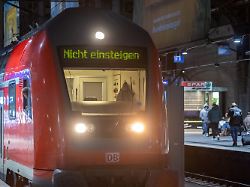Wissing wants arbitration
Six-day train drivers’ strike has begun
January 24, 2024, 4:41 a.m
Listen to article
This audio version was artificially generated. More info | Send feedback
Deutsche Bahn’s customers are now suffering, but there has never been a six-day standstill in the company’s history. The GDL has also been on strike on passenger transport since the night. Union leader Weselsky dispels hopes of an early end to the strike.
The train drivers’ strike by the German Locomotive Drivers’ Union (GDL) at Deutsche Bahn has started. The strike in freight transport began yesterday evening at 6 p.m., and passenger transport has also been on strike since 2 a.m. The industrial action is expected to last until Monday evening at 6 p.m. Passengers will have to come to terms with significant restrictions on long-distance and regional transport in the next few days. As with the previous strikes, the railway has set up a shortened timetable with a greatly reduced offer. Customers can find out which trains are running via the railway website or their app. The group also has a free information number have been set up to provide individual information about the timetable.
Anyone who has previously purchased a ticket for the strike period can postpone their journey to a later date. The railway has canceled the train connections. Seat reservations can be canceled free of charge. The consequences of the strike are not felt everywhere in regional transport because some of the railways’ competitors are there. In North Rhine-Westphalia, for example, around 40 percent of trains and S-Bahn trains will run, as the “Rheinische Post” reports.
It is the union’s fourth and longest strike to date. For the first time in the ongoing collective bargaining dispute, it also covers a complete weekend. The last time there was a strike of this magnitude was in 2015, when the strike lasted over five days. The following indefinite strike ended after three days through arbitration. Union leader Claus Weselsky brushed off hopes that there could be an early termination this time. “There will never be a last-minute agreement,” he told The Pioneer portal. Deutsche Bahn is only moving “one or three millimeters” towards the GDL. That is too little.
The situation is messed up. There have been no negotiations between the GDL and the railway since the end of November. The union under its boss Weselsky also saw no basis for discussion in the railway’s most recent offer. In December, the GDL had its members vote on indefinite strikes. Around 97 percent of the participating employees were in favor of this. Since then, strikes lasting several days have been possible.
The sticking point remains working hours
Federal Transport Minister Volker Wissing criticized the union: “The fact that a strike is being called for the fourth time in the ongoing conflict without even talking to each other is unacceptable,” the FDP politician told the “Bild” newspaper. He called on the collective bargaining parties to “find solutions at the negotiating table or initiate arbitration.”
In addition to financial demands, the collective bargaining dispute primarily revolves around the issue of reducing weekly working hours for shift workers. The GDL wants to reduce this from 38 to 35 hours while keeping the salary the same. Among other things, the railway has offered an option model that provides for a one-hour reduction without financial losses. Anyone who decides against this will instead receive 2.7 percent more money. Weselsky sees the offer as no basis for further negotiations.
The collective bargaining conflict is complicated by the fact that the GDL wants to expand its influence in the company and also conclude collective agreements for employees in the infrastructure division. There are already collective agreements there from the larger railway and transport union (EVG), with which the GDL competes. The railway has so far rejected this request.
